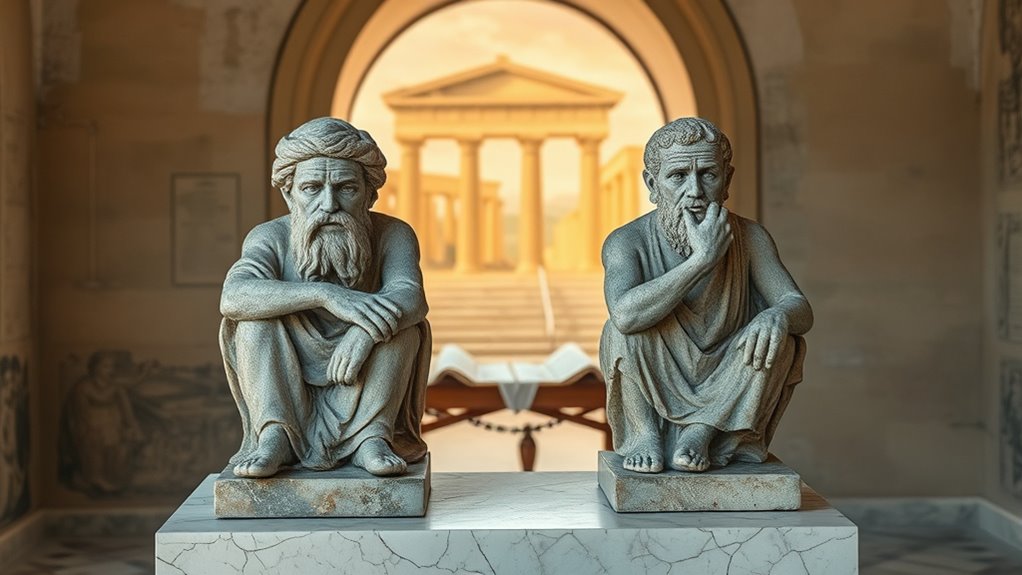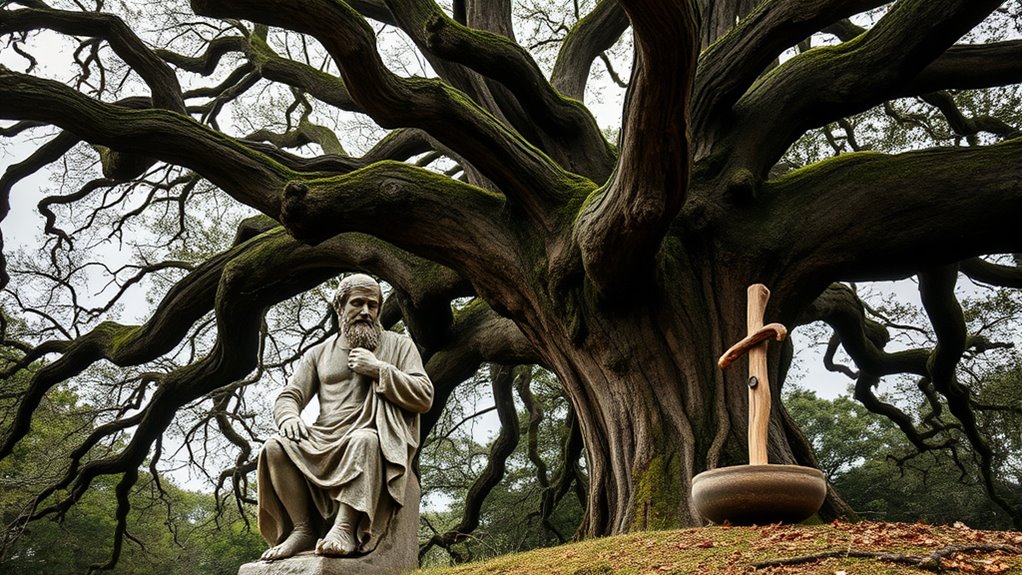Stoicism and Cynicism both focus on cultivating virtue and self-control to lead a fulfilling life. They emphasize independence from external possessions and societal expectations, advocating simplicity and resilience. Both philosophies see external wealth as indifferent and stress living in harmony with nature. They encourage you to develop moral integrity and respond to life’s challenges with inner strength. If you want to explore how these shared ideas can shape your approach to adversity, there’s more to discover ahead.
Key Takeaways
- Both philosophies originated in ancient Greece around the 4th century BCE, emphasizing ethical living amid societal upheaval.
- They prioritize cultivating virtues like self-control, wisdom, and moral integrity as paths to inner peace.
- External goods like wealth and possessions are viewed as indifferent, with emphasis on simplicity and detachment.
- Both advocate living in accordance with nature and accepting life’s transient nature to foster resilience.
- They promote independence from external influences, emphasizing inner virtue and discipline to handle personal and societal challenges.
Origins and Historical Context

Both Stoicism and Cynicism originated in ancient Greece around the 4th century BCE, during a time of political upheaval and philosophical exploration. You’re living in a period marked by the decline of city-states and the rise of new ideas about virtue, ethics, and how to live a good life.
Philosophers like Socrates challenged traditional beliefs, inspiring others to question authority and societal norms. Cynics, such as Diogenes, rejected material wealth and social conventions, seeking a life of simplicity. Their rejection of materialism was a radical departure from prevailing values and laid the groundwork for alternative approaches to happiness. Both philosophies emphasized practical virtue and resilience as essential for overcoming life’s challenges.
Meanwhile, Stoics like Zeno developed systems aimed at achieving inner peace through virtue and rationality. This era’s turbulence pushed thinkers to find practical ways to endure hardship and live ethically, setting the foundation for these influential philosophies. Vetted by experts in these schools emphasized the importance of practical virtue and resilience. Recognizing the importance of emotional control, both schools promoted mastery over passions to attain tranquility and moral integrity, emphasizing the role of emotional regulation in achieving a virtuous life. Additionally, their focus on self-discipline contributed significantly to the development of their ethical frameworks.
Emphasis on Virtue and Moral Character

In the philosophies of Stoicism and Cynicism, cultivating virtue and moral character takes center stage as the path to a good life. You focus on developing qualities like wisdom, courage, justice, and self-control, believing these traits define true worth. Both philosophies teach that external circumstances are less important than your internal moral compass. You’re encouraged to live authentically, aligning your actions with your values regardless of societal expectations or material success. For example, practicing vertical storage solutions can help you maintain a clutter-free environment that supports your internal discipline. Moral integrity isn’t just an ideal; it’s the foundation of happiness and tranquility. By prioritizing virtue, you aim to attain a sense of inner peace, unaffected by life’s ups and downs. Additionally, understanding the role of moral character in shaping a resilient and meaningful life underscores the importance of internal virtues over external conditions. Cultivating internal virtues contributes to a resilient and meaningful life, emphasizing the significance of moral development over external achievements. Recognizing the influence of external circumstances helps you stay grounded in your pursuit of virtue and inner harmony. Your commitment to moral character guides your choices, shaping a life rooted in integrity and resilience. Moreover, both philosophies highlight that true happiness stems from moral quality rather than fleeting external rewards.
Approach to Material Wealth and External Goods

While external goods like wealth and possessions can enhance comfort, they’re viewed with caution within Stoicism and Cynicism. Both philosophies see these as indifferent—neither inherently good nor bad. Recognizing that antioxidants support cellular health can help you understand their role in overall wellness. Your focus should be on how you relate to these goods, not on accumulating them. – Value only what supports your virtue, not possessions for their own sake. – Avoid attachment, so losing wealth doesn’t destabilize your inner peace. – Use external goods wisely, as tools, not as sources of happiness or identity. – Recognize that a high contrast ratio enhances the clarity of your inner values, just as it affects visual image quality. Cultivating self-awareness helps maintain perspective on what truly matters beyond material possessions. Additionally, understanding the nature of dog names can serve as a metaphor for choosing values that truly resonate with your character. Moreover, appreciating the craftsmanship behind vintage furniture can deepen your connection to authentic and meaningful possessions.
Living in Accordance With Nature

Living in accordance with nature means understanding and aligning your actions with the natural order of the universe. You recognize that everything has a place and purpose, and you accept the flow of life without resistance.
Align your actions with the universe’s natural flow and discover true harmony within.
Instead of fighting against circumstances, you adapt and make the best of what’s given. This involves accepting your role in the larger cosmos and fulfilling your natural duties. Tools and materials required: mattress, curtains, storage bins, and portable stove.
It also means appreciating the transient nature of life, recognizing that change is inevitable. By doing so, you cultivate contentment and resilience, avoiding unnecessary desires or frustrations. Safety considerations include securing items during travel and ensuring ventilation.
Furthermore, understanding adaptive learning techniques can help you better respond to life’s challenges and continuously grow in harmony with the world around you. Incorporating mindfulness practices can enhance your ability to stay present and aligned with your natural state. Staying informed about AI security vulnerabilities can also prepare you to safeguard your well-being in a rapidly evolving technological landscape. Additionally, being aware of noise levels of modern heat pumps can contribute to a more comfortable living environment. Living this way helps you stay grounded, focused on what truly matters, and in harmony with the universe’s inherent order. It’s about living authentically and in sync with the universe’s inherent order.
Responses to Societal Corruption and Personal Dissatisfaction

When you recognize that society often strays from natural harmony and personal dissatisfaction arises, your response reveals your inner stance.
You might choose to disengage, criticize openly, or seek inner resilience. Both Stoics and Cynics offer different ways to handle societal flaws:
- Disengage: Focus on your inner peace, ignoring corrupt influences.
- Criticize: Call out injustices, pushing for change or awareness.
- Resist: Live simply, rejecting societal values that cause dissatisfaction.
These responses reflect whether you believe change is possible externally or if inner strength is the key.
Stoics often emphasize accepting what they can’t control, while Cynics challenge societal norms outright.
Furthermore, some individuals leverage free crypto opportunities as a means to attain financial independence, aligning with the Cynic’s rejection of material excess and societal expectations.
Your choice shapes how you navigate personal and societal struggles.
Frequently Asked Questions
How Do Stoicism and Cynicism Influence Modern Self-Help Practices?
You might notice that modern self-help practices often emphasize resilience, mental clarity, and emotional control. These ideas draw from ancient philosophies, encouraging you to focus on what you can control and to develop a strong inner mindset.
What Are the Key Differences in Their Attitudes Toward Social Engagement?
You notice that social engagement varies between philosophies. Stoics see community as a way to practice virtue and fulfill their duties, engaging intentionally with society.
Cynics, however, tend to reject societal norms and avoid social obligations, emphasizing independence and self-sufficiency.
While Stoics participate actively to align with virtue, Cynics distance themselves to maintain personal integrity, often criticizing social values and conventions.
How Did Their Views on Happiness Evolve Over Time?
Imagine happiness as a river that twists and turns through your life. Over time, you might find it shifting from fleeting pleasures to a steady, calm stream.
You begin to see happiness less as a treasure to chase and more as a state to nurture within.
As you grow, your view deepens, realizing that true happiness flows from inner resilience and virtue, not external rewards.
Are There Contemporary Figures Known for Practicing These Philosophies?
You’re curious if any modern figures practice these philosophies. Several contemporary leaders and thinkers, like Ryan Holiday and Massimo Pigliucci, openly embrace Stoicism, applying its principles in daily life and leadership.
Cynicism’s influence is less direct but can be seen in critics and activists who challenge societal norms and materialism.
These philosophies still inspire many today, helping you navigate challenges, find resilience, and seek authentic happiness in a complex world.
How Do These Philosophies Address Mental Health and Emotional Resilience?
When you seek mental clarity, emotional strength, and resilience, these philosophies guide you to focus on what you can control, accept what you cannot, and maintain a balanced perspective.
They teach you to practice mindfulness, develop self-awareness, and cultivate calmness amid chaos.
Conclusion
As you explore stoicism and cynicism, you realize both philosophies urge you to focus on virtue and inner resilience, much like a modern-day Jedi steering a chaotic galaxy. You understand that true happiness isn’t found in external riches or fleeting pleasures but in living according to nature and moral integrity. Embracing their teachings helps you stay grounded amid societal chaos, reminding you that, even in a world full of digital distractions, your character remains your greatest asset.









